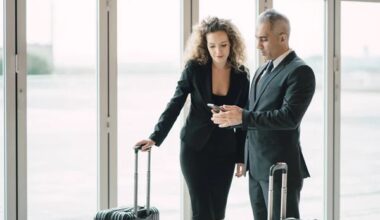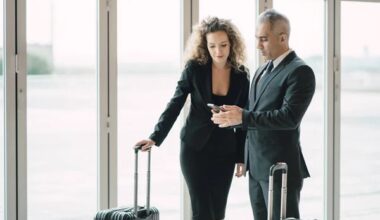Exploring business travel requires a specific set of communication skills, especially when working across cultures.
Using clear, professional English not only helps you create great first impressions but also builds confidence and understanding with international clients and colleagues.
Whether you’re checking in, networking, or troubleshooting, these essential English phrases for business travel will make your experience smoother and more successful. Below, you’ll find the top phrases, examples, and practical scenarios to help you communicate effectively on any business trip.
Essential English Phrases for Business Travel
- “Could I have a receipt, please?”
- “Could you help me with directions to [location]?”
- “What time is check-out/check-in?”
- “Could I have a late check-out, please?”
- “Is breakfast included?”
- “Could you confirm my reservation?”
- “May I have the bill, please?”
- “Could you arrange a taxi for me?”
- “Is there Wi-Fi available?”
- “Could I get some assistance with my luggage?”
- “I have a reservation under the name [your name].”
- “Would you mind recommending a nearby restaurant?”
- “I’m here on business with [Company Name].”
- “Could you connect me to [person or department]?”
- “It was a pleasure meeting you.”
- “Could you clarify that last point, please?”
- “Thank you for your hospitality.”
- “When would be a good time to follow up?”
- “Could I borrow an adapter, please?”
- “Can we set up a meeting for [date/time]?”
- “Would you mind sending me the agenda?”
- “Could you recommend a quiet place to work nearby?”
- “Thank you for your time.”
- “Do you have any local insights that might be useful for my visit?”
- “Could you send that document to my email, please?”
Practical Scenarios Using Business Travel Phrases
1. At the Hotel Reception
Your hotel check-in often sets the tone for your trip, and using polite, professional English here makes a great impression.
- Example:
“Hello, I have a reservation under the name Alex Johnson. Could you confirm my reservation, please?” - Scenario:
You arrive late due to a delayed flight and need a smooth check-in process. Polite phrases like “Could you confirm my reservation?” and “Could I have a late check-out?” ensure that you’re prepared for potential changes without sounding demanding.
2. Requesting Assistance with Logistics
Business travellers often need quick solutions for local transportation, dining, and internet access.
- Example:
“Could you arrange a taxi for me to the conference centre tomorrow at 8 a.m., please?” - Scenario:
For early-morning meetings, pre-arranging transportation saves time and adds convenience. Phrasing your request with “Could you arrange a taxi for me…” conveys professionalism and clarity.
3. Networking and Making Introductions
Introductions are essential, and learning how to do this effectively in English can help you establish strong connections.
- Example:
“I’m here on business with GlobalTech Solutions. It’s a pleasure to meet you.” - Scenario:
Whether you’re at a networking event or meeting with a partner, a short introduction like “I’m here on business with [Company Name]” provides context and sounds professional.
4. Dining and Entertaining Clients
Dining with clients often provides valuable time to build rapport. Knowing how to handle the bill or make a polite recommendation can make a difference.
- Example:
“May I have the bill, please?”
“Would you mind recommending a nearby restaurant for lunch?” - Scenario:
After a productive meeting, you take a client out for lunch. Asking for the bill directly and politely, such as “May I have the bill, please?” shows courtesy. Requesting a restaurant recommendation also shows that you value the local expertise of your host.
5. In Meetings and Presentations
Effective communication in meetings allows you to fully engage with clients and colleagues. Using polite inquiries and offering thanks goes a long way.
- Example:
“Could you clarify that last point, please?”
“Thank you for your insights, I’ll follow up on that.” - Scenario:
During a meeting, you might need clarification on certain points. Phrasing this as “Could you clarify that last point, please?” shows respect for the speaker and ensures that you get the information you need without interrupting the flow of conversation.
6. Asking for Assistance with Technology
Business travellers often rely on internet access and other technology for productivity. Asking politely can make tech-related requests smoother.
- Example:
“Is there Wi-Fi available here?”
“Could I borrow an adapter, please?” - Scenario:
If you need Wi-Fi or equipment, a simple question like “Is there Wi-Fi available here?” can help you confirm resources without sounding too assertive.
7. Making Requests for Schedules and Agendas
Before meetings, it’s often helpful to have a set agenda to know what to expect and prepare in advance.
- Example:
“Would you mind sending me the agenda for tomorrow’s meeting?” - Scenario:
By asking for an agenda politely, you show that you’re organised and serious about the meeting’s objectives. It’s an excellent habit, especially when working in a fast-paced international environment.
8. Following Up on Meetings and Contacts
Following up effectively after meetings is crucial to sustaining good relations and moving forward with business.
- Example:
“When would be a good time to follow up on today’s discussion?”
“Could you send that document to my email, please?” - Scenario:
If a contact agrees to send you documents, follow up politely to ensure that both parties are clear on next steps. Asking, “Could you send that document to my email?” reaffirms your interest in receiving information without seeming impatient.
Additional Tips for Business Travelers Communicating in English
- Use Polite Language:
Business culture often favors polite and respectful language. Using phrases like “Could you…” or “Would you mind…” demonstrates professionalism and respect for others’ time. - Keep It Simple:
Use clear, straightforward language to avoid confusion, especially when dealing with people who might also be using English as a second language. - Practise Active Listening:
A vital part of communication is listening carefully. Acknowledge key points by paraphrasing or politely asking questions for clarity. - Show Appreciation:
Saying “Thank you for your time” at the end of a meeting or “Thank you for your hospitality” when leaving shows that you value others’ contributions, a gesture that goes a long way in professional settings. - Adjust Your Tone for Formality:
Always gauge the level of formality needed based on the company culture, region, and individual you’re interacting with. In some cultures, straightforward language is preferred, while others may favor highly formal expressions.
Conclusion
With these 25 Essential English Phrases for Business Travel, you’re well-equipped to handle a variety of professional situations abroad.
Remember, communication is key to successful business travel, as it fosters relationships, ensures smooth logistics, and reflects positively on you and your company.
Incorporating these phrases into your business vocabulary will help you appear professional, polite, and well-prepared no matter where work takes you.
Start practising these phrases before your next trip, and you’ll be ready to communicate effectively with international clients and colleagues, building strong professional connections around the world.







